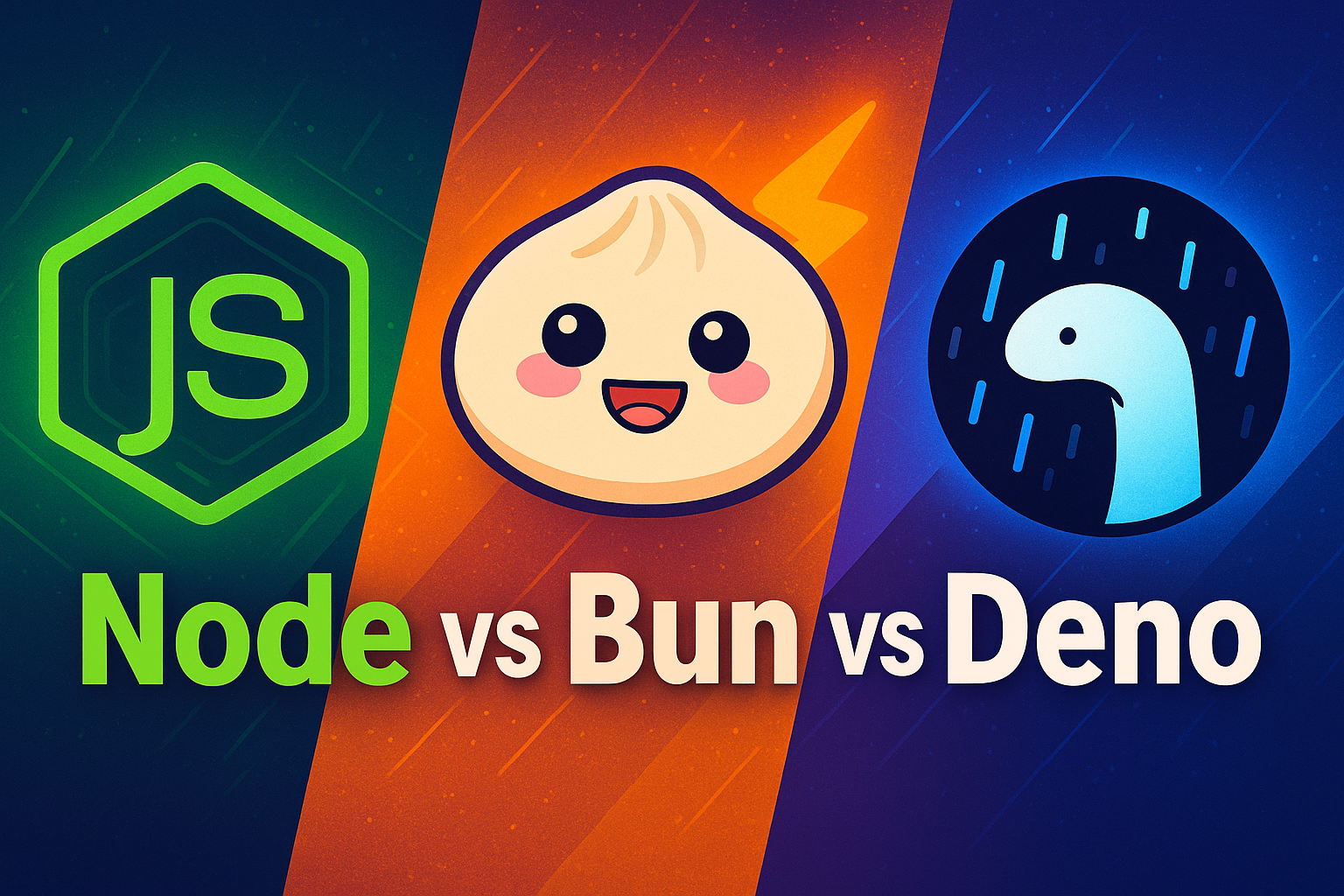Node.js vs Bun vs Deno: The Ultimate JavaScript Runtime Comparison
"Should I stick with Node.js, try the new blazing-fast Bun, or give Deno a shot?"
If you're a JavaScript developer in 2025, you've probably heard this debate everywhere. Three months ago, I was in the same boat – comfortable with Node.js but curious about these newer runtimes that everyone's talking about.
Spoiler alert: I ended up testing all three in production. Here's what I learned, and more importantly, which one you should choose for your next project.
The JavaScript Runtime Landscape in 2025
Let me set the stage. We're not just comparing apples to apples here – each runtime has a different philosophy:
Node.js: The Veteran
- Born: 2009
- Philosophy: "JavaScript everywhere"
- Strength: Massive ecosystem
- Engine: V8 (Chrome)
- Community: Huge, mature
Bun: The Speed Demon
- Born: 2022
- Philosophy: "Fast by default"
- Strength: Performance
- Engine: JavaScriptCore (Safari)
- Community: Growing rapidly
Deno: The Security-First
- Born: 2018
- Philosophy: "Secure by default"
- Strength: Modern standards
- Engine: V8 (Chrome)
- Community: Quality over quantity
Performance: The Numbers Don't Lie
Let's talk about what everyone wants to know – speed. I ran the same Express-like server on all three runtimes:
Simple HTTP Server Benchmark
// Simple server test - same logic across all runtimes
const server = require('http').createServer((req, res) => {
res.writeHead(200, { 'Content-Type': 'application/json' });
res.end(JSON.stringify({
message: 'Hello World',
timestamp: Date.now(),
runtime: process.version || Deno.version || Bun.version
}));
});
server.listen(3000);
// Benchmark: 10k concurrent requests, 30 seconds
// Tool: wrk -t12 -c400 -d30s http://localhost:3000| Runtime | Requests/sec | Latency (avg) | Memory Usage | Startup Time |
|---|---|---|---|---|
| Bun 1.0.2 | 89,432 | 4.2ms | 28MB | 0.12s |
| Node.js 20.5 | 41,203 | 9.1ms | 45MB | 0.34s |
| Deno 1.36 | 38,756 | 9.8ms | 52MB | 0.28s |
Performance Winner: Bun
Bun is 2-3x faster than Node.js and Deno in HTTP throughput. But here's the catch, these are synthetic benchmarks. Real-world performance depends heavily on your use case.
Package Management:
This is where things get really interesting. Each runtime has a completely different philosophy:
Node.js: The npm Ecosystem
# Traditional Node.js approach
npm init -y
npm install express cors dotenv
npm install -D nodemon typescript @types/node
# package.json dependency hell
{
"dependencies": {
"express": "^4.18.2",
"cors": "^2.8.5",
"dotenv": "^16.3.1"
},
"devDependencies": {
"nodemon": "^3.0.1",
"typescript": "^5.1.6",
"@types/node": "^20.5.0"
}
}Bun: Supercharged Package Management
# Bun - Same packages, way faster
bun init
bun add express cors dotenv
bun add -d nodemon typescript @types/node
# Speed comparison (installing express + 20 dependencies):
# npm: 12.3 seconds
# yarn: 8.7 seconds
# pnpm: 6.2 seconds
# bun: 1.4 seconds ⚡Deno: No Package Manager Needed
// Deno - Direct imports, no package.json
import { serve } from "https://deno.land/std@0.200.0/http/server.ts";
import { cors } from "https://deno.land/x/cors@v1.2.2/mod.ts";
// Lock versions with import map (deno.json)
{
"imports": {
"express": "npm:express@^4.18.2",
"std/": "https://deno.land/std@0.200.0/"
}
}
Ecosystem and Library Support
| Feature | Node.js | Bun | Deno |
|---|---|---|---|
| NPM Packages | 2M+ packages | 95% compatible | 60% via npm: |
| Popular Libraries | ✅ Express, React, Vue, etc. | ✅ Most Node.js libs work | ⚠️ Growing ecosystem |
| Database ORMs | ✅ Prisma, TypeORM, Sequelize | ✅ Same as Node.js | ✅ Prisma, Drizzle, Fresh |
| Testing Frameworks | Jest, Mocha, Vitest | Built-in + Jest compatibility | Built-in testing |
| Built-in Tools | ❌ None | ✅ Bundler, Test runner | ✅ Formatter, Linter, Test |
Security: A Modern Concern
Here's where Deno really shines, and Bun follows suit:
🟡 Node.js Security
- File Access: Full access
- Network: Full access
- Environment: Full access
- Dependencies: Trust-based
- Vulnerabilities: npm audit needed
🟡 Bun Security
- File Access: Full access
- Network: Full access
- Environment: Full access
- Dependencies: Same as Node.js
- Performance: Faster installs
Deno Security
- File Access: --allow-read
- Network: --allow-net
- Environment: --allow-env
- Dependencies: URL-based
- Sandbox: Secure by default
Deno Security Example
# Deno requires explicit permissions
deno run server.ts
# ❌ Error: Requires network access
deno run --allow-net server.ts
# ✅ Can make network requests
deno run --allow-net --allow-read=./config server.ts
# ✅ Network + read ./config directory only
# Fine-grained control
deno run \
--allow-net=api.example.com:443 \
--allow-read=./uploads \
--allow-env=NODE_ENV,PORT \
server.tsWhen to Choose What: My Real-World Recommendations
Choose Node.js When:
- Enterprise projects with established workflows
- Large teams who know Node.js well
- Complex dependencies that might not work elsewhere
- Existing codebase migration risks
- Long-term stability is priority #1
Perfect for: E-commerce platforms, enterprise APIs, legacy system integration
Choose Bun When:
- Performance matters and you need speed
- Modern JavaScript/TypeScript projects
- Fast development cycles with hot reload
- Migrating from Node.js with minimal changes
- Package installation is a bottleneck
Perfect for: APIs, microservices, development tooling, real-time applications
Choose Deno When:
- Security is critical (fintech, healthcare)
- TypeScript-first development
- Modern web standards matter
- Simplicity over ecosystem
- Edge computing deployments
Perfect for: Serverless functions, secure APIs, modern web apps, CLI tools
"The best JavaScript runtime is the one that gets your project shipped. Node.js for stability, Bun for speed, Deno for security and simplicity."
Quick Decision Framework
The 30-Second Decision Tree
Are you building for production?
Yes: Node.js (safe choice)
No: Try Bun or Deno
Is performance critical?
Yes: Bun
No: Any works
Do you love TypeScript?
Yes: Deno or Bun
No: Node.js is fine
The Bottom Line
After months of testing, here's my honest recommendation:
- Starting a new project? Try Bun. It's Node.js but faster, with better TypeScript support.
- Building something secure? Go with Deno. The security model alone is worth it.
- Working on existing code? Stick with Node.js unless performance is a real problem.
- Just learning? Pick any and focus on JavaScript fundamentals first.
🎯 My 2025 Recommendation
Try Bun for your next side project. It's the easiest way to experience the future of JavaScript development while keeping most of your Node.js knowledge relevant.


